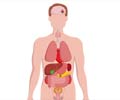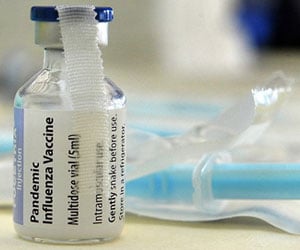A gene variant called CHI3L1 is the main culprit in increasing the risk of asthma, bronchial hyperresponsiveness and decline in lung function, a new study by researchers at the University of Chicago has found
While the gene variant usually leads to increased blood levels of YKL-40, which is a biomarker for asthma, a somewhat different genetic variant of the same gene causes lower levels of YKL-40 and in turn renders protection against asthma.Elizabeth G. Nabel, M.D., director, the National Heart, Lung, and Blood Institute, said that this gene, "may have important implications in the early identification of, susceptibility to, and prevention and treatment of asthma.
"This is exciting because it connects asthma susceptibility to a whole new pathway at the protein and the genetic levels," said study author Carole Ober, professor of human genetics at the University of Chicago Medical Center.
She added: "This is also the most significant genetic discovery based on our years of gathering data on asthma in the Hutterites," Ober added. "This is a group with enormous potential to advance our understanding of the genetic underpinnings of disease. We now have a remarkable collection of data, which we expect will lead us to many more insights."
The researchers mainly concentrated towards a population, called Hutterites, a genetically isolated U.S. religious community descended from about 90 people, and explained their choice by saying: "They eat the same food, live off the same allowance and have the same education. They have similar, but not identical genomes. So the genes that make a difference are easier to detect."
In 1996 and 1997, the researchers collected clinical data about asthma from more than 700 members of the Hutterite communities, and stored blood samples that were recently used to measureYKL-40 levels. Amongst them, almost 11 percent of Hutterites had asthma and another 12 percent had bronchial hyperresponsiveness.
Advertisement
YKL-40 is suspected to be natural cause of asthma and it belongs to a family of enzymes called chitinases. The chitinases help break down chitin, a common biologic polymer found especially in insects like dust mites and cockroaches. They also trigger inflammation, which is one of the main characteristic of asthma.
Advertisement
Thus they searched for variations in the CHI3L1 gene on chromosome 1 that codes for YKL-40 and found that Hutterites with asthma were more prone to have a small but consistent variation in one part of the gene, called a promoter, which regulates when the gene is expressed.
Thus the authors suspect that this change reduces expression of the gene and finally causes lower levels of YKL-40 and protection from asthma.
"This evolutionarily ancient pathway involving the innate immune system plays a surprisingly important role in asthma pathogenesis and a single genetic variant in the CHI3L1 gene may account for most of this risk," said Ober.
She added that this could have a significant impact on drug development, saying: "For some people, if you block YKL-40 you might dramatically reduce the severity of the disease. Knowing the genotype at SNP -131C might identify those who most likely to benefit from such a treatment."
The study appears in the early online in the New England Journal of Medicine.
Source-ANI
RAS/L











